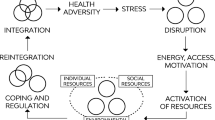Abstract
John Henry (JH) theory provides a framework for understanding the physiological toll exerted on low socioeconomic status (SES) individuals as they overcome psychosocial stressors imposed by their environments. This theory suggests that resilience, a seemingly positive social adaptation, may in fact be physically deleterious. JH theory has been well-described in low-SES rural male African Americans, however it is currently unclear whether validity of this theory extends to women, other races and outside the rural US. We assessed whether, in individuals with low income, there is an association between self-mastery/resilience and either blood pressure or depressive symptoms that is different from the association seen in individuals with higher income. Data were obtained from 1353 older men and women participants of the International Mobility in Aging Study (IMIAS). Across 3 countries and 4 sites, higher self-mastery/resilience was associated with lower depressive symptoms in both low and high income groups. In low income individuals from Saint-Hyacinthe, Québec, higher self-mastery/resilience was associated with both higher mean systolic blood pressure (n = 240, β = 0.135, p ≤ 0.05) and higher mean diastolic blood pressure (n = 240, β = 0.241, p ≤ 0.0001). In the high income group of Saint-Hyacinthe, no such associations were observed. The findings in the Saint-Hyacinthe cohort (but not the other settings), are consistent with the John Henry hypothesis, and demonstrates this effect extends beyond a rural African American population. This finding indicates that in certain populations, the positive psychological effects of resilience come with a cost to physical health.




Similar content being viewed by others
Abbreviations
- CESD:
-
Center for Epidemiologic Studies Depression Score
- DBP:
-
Diastolic blood pressure
- HR:
-
Heart rate
- IMIAS:
-
International Mobility in Aging Study
- JH:
-
John Henry
- JHAC12:
-
John Henry Active Coping Scale
- SBP:
-
Systolic blood pressure
- SES:
-
Socioeconomic status
- US:
-
United States
References
Brody, G. H., Yu, T., Chen, E., Miller, G. E., Kogan, S. M., & Beach, S. R. (2013). Is resilience only skin deep?: Rural African Americans' socioeconomic status-related risk and competence in preadolescence and psychological adjustment and allostatic load at age 19. Psychological Science, 24(7), 1285–1293. https://doi.org/10.1177/0956797612471954.
Coker, A. L., Sanderson, M., Ellison, G. L., & Fadden, M. K. (2006). Stress, coping, social support, and prostate cancer risk among older African American and Caucasian men. Ethnicity and Disease, 16(4), 978–987.
Cvorovic, J., & James, S. A. (2018). John Henryism, gender and self-reported health among Roma/gypsies in Serbia. Culture, Medicine and Psychiatry, 42(2), 295–314. https://doi.org/10.1007/s11013-017-9561-8.
Flaskerud, J. H. (2012). Coping and health status: John Henryism. Issues in Mental Health Nursing, 33(10), 712–715. https://doi.org/10.3109/01612840.2012.673695.
James, S. A. (1994). John Henryism and the health of African-Americans. Culture, Medicine and Psychiatry, 18(2), 163–182.
LeBron, A. M., Schulz, A. J., Mentz, G., & White Perkins, D. (2015). John Henryism, socioeconomic position, and blood pressure in a multi-ethnic urban community. Ethnicity & Disease, 25(1), 24–30.
Logan, J. G., Barksdale, D. J., & Chien, L. C. (2014). Exploring moderating effects of John Henryism active coping on the relationship between education and cardiovascular measures in Korean Americans. Journal of Psychosomatic Research, 77, 552–557.
Merritt, M. M., Bennett, G. G., Williams, R. B., Sollers, J. J., 3rd, & Thayer, J. F. (2004). Low educational attainment, John Henryism, and cardiovascular reactivity to and recovery from personally relevant stress. Psychosomatic Medicine, 66(1), 49–55.
Pearlin, L. I., & Schooler, C. (1978). The structure of coping. Journal of Health and Social Behavior, 19(1), 2–21.
Pearlin, L. I., Lieberman, M. A., Menaghan, E. G., & Mullan, J. T. (1981). The stress process. Journal of Health and Social Behavior, 22(4), 337–356.
Radloff, L. S. (1977). The CES-D scale a self-report depression scale for research in the general population. Applied Psychological Measurement, 1(3), 385–401.
Wagnild, G. (2009). A review of the resilience scale. Journal of Nursing Measurement, 17(2), 105–113.
Wagnild, G. M., & Young, H. M. (1993). Development and psychometric evaluation of the resilience scale. Journal of Nursing Measurement, 1(2), 165–178.
Ylli, A., Miszkurka, M., Phillips, S. P., Guralnik, J., Deshpande, N., & Zunzunegui, M. V. (2016). Clinically relevant depression in old age: An international study with populations from Canada, Latin America and Eastern Europe. Psychiatry Res, 241, 236–241. https://doi.org/10.1016/j.psychres.2016.04.096.
Zunzunegui, M. V., Alvarado, B. E., Guerra, R., Gomez, J. F., Ylli, A., Guralnik, J. M., & Imias Research, G. (2015). The mobility gap between older men and women: The embodiment of gender. Archives of Gerontology and Geriatrics, 61(2), 140–148. https://doi.org/10.1016/j.archger.2015.06.005.
Acknowledgements
Thank you to Dr. Chris O’Callaghan for providing guidance and expertise with the statistical analysis.
Funding
This research was funded as a multi-year team grant by the Canadian Institutes of Health Research (application # 229036, FRN# 108751.)
Author information
Authors and Affiliations
Contributions
SP was responsible for the initial study concept and manuscript revision. SG further developed the study concept, performed data processing, data analysis and drafted the manuscript, under the supervision of SP. EB provided critical revisions.
Corresponding author
Ethics declarations
Competing Interests
The authors declare that they have no conflict of interest.
Additional information
Publisher’s Note
Springer Nature remains neutral with regard to jurisdictional claims in published maps and institutional affiliations.
Rights and permissions
About this article
Cite this article
Gupta, S., Bélanger, E. & Phillips, S.P. Low Socioeconomic Status but Resilient: Panacea or Double Trouble? John Henryism in the International IMIAS Study of Older Adults. J Cross Cult Gerontol 34, 15–24 (2019). https://doi.org/10.1007/s10823-018-9362-8
Published:
Issue Date:
DOI: https://doi.org/10.1007/s10823-018-9362-8




